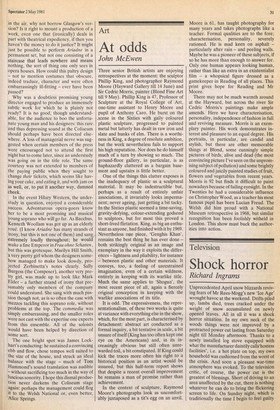Opera
Irony
Rodney Manes
Ariadne auf Naxos (Coliseum) The questions raised by this disastrous evening have as little to do with Strauss's opera as the production itself, save in the many layers of irony contained therein. The story so far: the policy of productionsharing between the English National and the Royal Opera in the Seventies enabled audiences to enjoy Maria Stuarda and Werther sung first by Dame Janet Baker at the Coliseum and later by such stars as Joan Sutherland and Frederica von Stade at the Garden. A good idea. The traffic remained one-way, however; when four years ago the Coliseum management clapped eyes on the Ariadne they were supposed to be sharing with the Garden, they reneged on the deal, which can have done relations between the two houses little good. Ironically, what the Coliseum has ended up with makes the not exactly flawless Garden version look like the work of Max Reinhardt himself, and the only light relief last week must have been the thin smile on the face of Sir John Tooley when he read the notices.
The new Ariadne replaces an excellent one by Anthony Besch, and has uncomfortable similarities to Besch Mark II in Glasgow, in that it is updated to roughly the time of composition. At least Besch 11 updated consistently; the Coliseum updates half-heartedly— what is a commedia dell' arte troupe doing in 20th-century Vienna? If, as is plain from this staging, the Coliseum is economising like fury, and if updating was in the air, why not borrow Glasgow's version? Is it right to mount a production of a work, even one that (ironically) deals in part with theatrical expediency, if then you haven't the money to do it justice? It might just be possible to perform Ariadne in a permanent set, but not one consisting of a staircase that leads nowhere and means nothing, the sort of thing one only sees in opera houses. How could this paltry design — not to mention costumes that obscure, indeed traduce, character and were often embarrassingly ill-fitting — ever have been passed?
Why was a doubtless promising young director engaged to produce an immensely subtle work for which he is plainly not ready? It is no good, though understandable, for the audience to boo the unfortunate young man and his designers: this rare and thus depressing sound at the Coliseum should perhaps have been directed elsewhere. A loss of managerial nerve was suggested when certain members of the press were encouraged not to attend the first night but to come later, since an understudy was going on in the title role. The same courtesy was not extended to members of the paying public when they sought to change their tickets, which seems like having your cake, and eating it, and with jam on as well, or, to put it another way, damned cheek.
In the event Hilary Western, the understudy in question, enjoyed a considerable success. Adventurous opera-goers know her to be a most promising and musical Young soprano who will go far. As Bacchus, Kenneth Woollam was got up as an elderly roué. (I know Ariadne has many strands of irony, but this is not one of them) and sang extremely loudly throughout; he would make a fine Emperor in Frau ohne Schatten , but this was grotesque. Marilyn Hill Smith, a very pretty girl whom the designers somehow managed to make look dowdy, projected Zerbinetta's notes clearly. Sally Burgess (the Composer), another very pretty girl, was made up to look like Mark Elder — a further strand of irony that presumably only members of the company could understand. She sang with much passion though not, as is so often the case with mezzos tackling this soprano role, without problems at the top. The cornmedia was simply embarrassing, and the smaller roles were not cast with the expertise one expects from this ensemble. All of the soloists would have been helped by direction of some sort.
The one bright spot was James Lockhart's conducting: he sustained a convincing ebb and flow, chose tempos well suited to the size of the house, and struck an ideal balance with the stage — much of Tom Hammond's sound translation was audible — without sacrificing too much in the way of luscious sonority. I hope this dismal production never darkens the Coliseum stage again: perhaps the management could flog it to the Welsh National or, even better, Alice Springs.



















































































 Previous page
Previous page